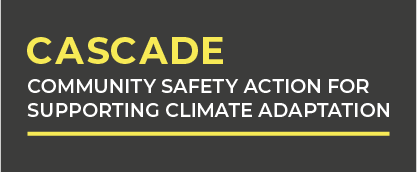CASCADE aimed to improve the capacity to understand, assess, and treat current and future climate change related risks on the local level, focusing on the particular in Baltic Sea Region (BSR) conditions.
Project description
The unique project increased practical risk management capabilities of local authorities in the Baltic Sea Region by bringing together local administrations and civil protection practitioners, experts at universities and companies, national civil protection authorities and international bodies.
The project sought to improve urban resilience in cities and towns, as well as the overall macro–regional resilience. The expected outcome of CASCADE was to adapt existing risk assessment methodology to the climate change context and tailor it to the local level.
This methodology was used in a training course for city officials, responsible for civil protection. CASCADE also strived for initiating a region – wide policy dialogue on the UN Sendai Framework for Disaster Risk Reduction as an effective platform for cross – sectorial cooperation between different levels of governance and for greater policy coherence on climate risk assessments.
Project Leader: City of Turku
Funding programme: DG ECHO
Time span: 2019-2020
Project partners:
- Southwest Finland Emergency Services – Lead partner
- Union of the Baltic Cities - Sustainable Cities Commission (UBC SCC)
- Council of the Baltic Sea States Secretariat (CBSS)
- MSB Swedish Civil Contingencies Agency (MSB)
- Main School of Fire Services (SGSP)
- Hamburg Fire and Rescue Service (HFRS)
- UBC Safe Cities Commission/ Liepaja Municipal police
- Frederiksborg Fire & Rescue Services
- Stockholm Environment Institute in Tallinn (SEI Tallinn)
- Abo Akademi University/CLL in Finland
Results
- An online tool for integrated climate change and disaster risk reduction management
- Guidelines for local level public administration on how to operationalize the proper risk treatment options
- Training courses for the target groups, i.e. City officials responsible for civil protection in municipalities, city planners, architects, spatial planners, etc.
- Policy dialogues between local, national, macro-regional, and international actors to
- Mainstream climate risk assessment into management and policy planning on the national and local level to
- ensure coherence of relevant policies in the macro-region, as well as to
- ensure sustainability and ownership of the project’s results through anchoring the results in the relevant policy level, and with the relevant stakeholders
Funding
DG ECHO
